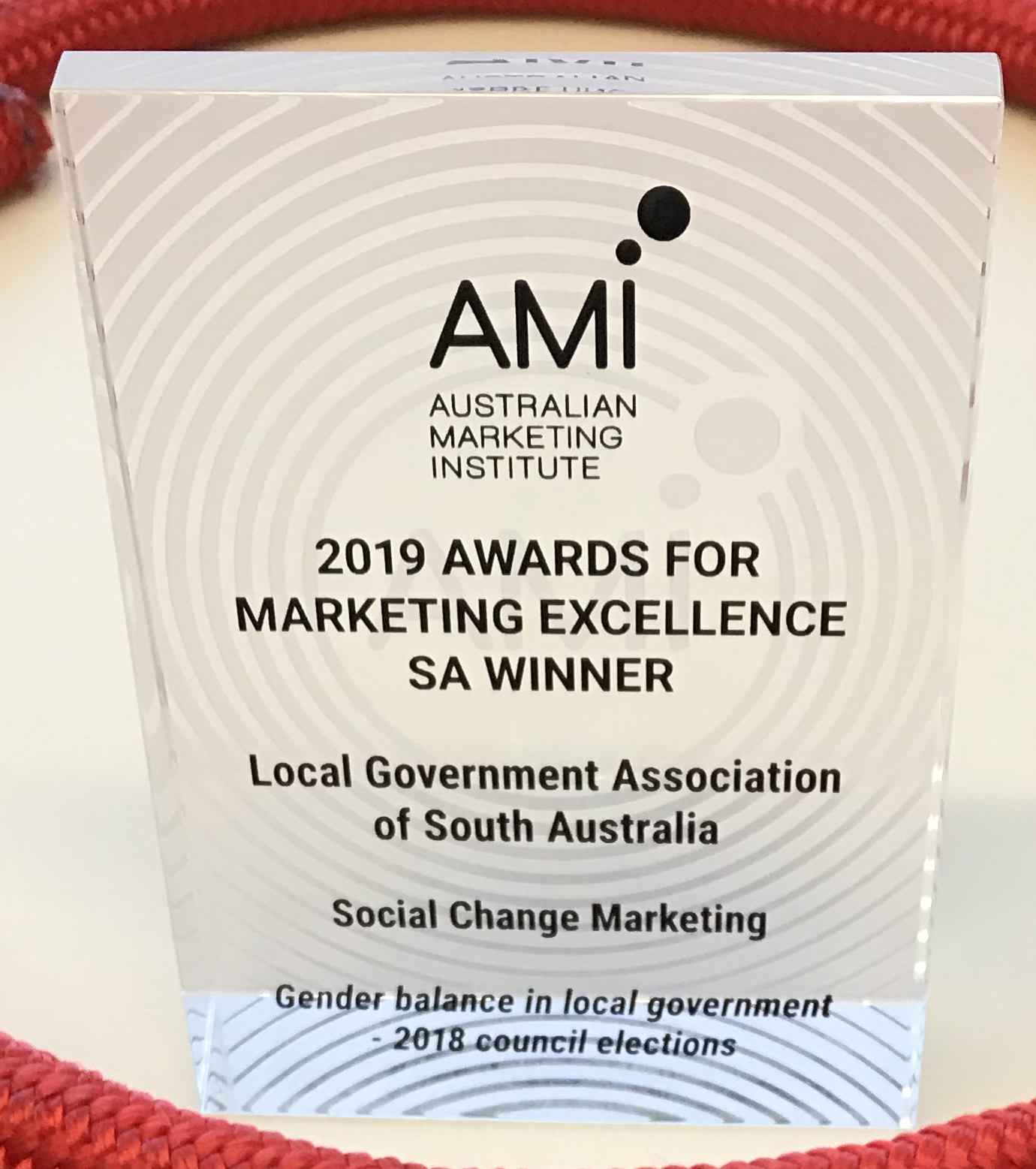2018 Council elections

This project's final report and evaluation was completed on 7 January 2020.
Project approach
The Local Government Elections project was undertaken by the recipient based on a comprehensive project plan which follows on from the previous R&D project.
The key milestone dates and deliverables and key areas of responsibility and human resources required to successful complete the project was scoped to ensure successful delivery of this project for #sacouncils.
LGA’s Marketing & Communications Manager led the project from within the LGA with support from the Policy Director and a contracted project manager. Key functional areas within the LGA for instance, policy, legislation IT, E&T, and procurement and also the services of external consultants for elements such as community engagement and market research as well as relevant stakeholders like Electoral Commission of SA, Revenue Professionals SA (RPSA) and key council networking groups LG Communicators Network & Governance networks were engaged and consulted.
This project took place across two financial years.
Based on the outcomes of the Greenhill review and further feedback and direction from member councils, the LGA set the following objectives for the 2018 council elections:
- improve member satisfaction with and use of the LGA promotional materials
- make promotional materials available to members in November 2017, 12 months prior to the conclusion of the elections
- review and refresh all council election resources provided by the LGA to councils and candidates
- increase the diversity of people nominating for council elections, with a particular emphasis on increasing female participation in local government
- increasing the awareness of prospective candidates about the role, required leadership capabilities of council members
- ensure adequate resources within the LGA to manage the election program and provide strong member support.
After the elections, council staff completed surveys, and members of the broader South Australian community participated in brand segmentation research which enabled the LGA to gauge the level of council satisfaction.
The LGA conducted two surveys (council staff and community awareness/recall), and ECSA conducted council CEOs, Liaison Officer and candidate surveys. To enable a proper comparison of data for future election campaigns, it is recommended that a joint research analysis is conducted, as this will avoid duplication, and greater costs passed onto councils (in ECSA’s case).
Process improvements
The Greenhill report made a number of recommendations related to the LGA’s council elections processes. Some of the key recommendations included:
- The LGA’s processes in 2014 lacked a formal planning framework, clear lines of authority, and sufficient human resources
- Supporting materials and creative for the 2014 elections were delivered later than optimum for member councils.
- The provision of support for the candidates’ website was outsourced to a call centre in 2014, which wasn’t ideal
- In 2014 the development of creative resources by the LGA and ECSA was poorly coordinated and there was a lack of clarity regarding authority relating to 'sign off' on materials
- Elected members and other stakeholders felt that awareness of the candidates’ website among the voting public was poor and that the site should be promoted more strongly prior to the 2018 elections.
In 2014, the profiles of candidates elected unopposed were not included in the postal voting packs sent to voters by ECSA, nor provided to the LGA for website publication, in accordance with ECSA’s interpretation of the Act.
At the time, the LGA Board resolved that a proposal be developed whereby voters are informed by mail about candidates who are elected unopposed.
Project outputs and outcomes
The recommended improvements related to the LGA’s processes were accepted and broadly implemented. The Greenhill report also made several recommendations relating to changes to the Local Government (Elections) Act 1999. The LGA advocated for these changes and a Bill was introduced by the former State Government in the Parliament in 2017, however legislative change was not achieved prior to the 2018 council elections.
As a result of the Greenhill report, the planning for the 2018 elections commenced much earlier and in a more structured manner, and additional resources were put in place to manage and implement the program.
The outcome was a better resourced and organised program, with improved engagement with councils, materials of higher quality being made available to councils in reasonable timeframes, and greater uptake in the use of tailored materials provided free of charge to councils on request.
Councils reported a high level of satisfaction with the documents, materials, training and service provided by the LGA. Council staff particularly appreciated the council elections web portal, comprehensive resources, and the two election workshops that were held with council officers to ensure they were across the details of the council elections campaign and had an opportunity to provide feedback.
Twelve (12) Make a Difference nominate for council training sessions were held around the state. Sessions were held at Alexandrina Council, City of Victor Harbour, City of West Torrens, District Council of Robe, City of Mount Gambier, Town of Gawler, Port Pirie Regional Council, Berri Barmera Council, and City of Port Lincoln, and were attended by 180 people.
These sessions were delivered by the LGA’s Education & Training services, and the presentations were facilitated by the LGA’s Executive Leadership Team. This was a marked improvement as there were only two sessions held in 2014 with under 80 attendees, and none held regionally. In addition, the LGA provided collateral for individual councils to conduct their own candidate briefing sessions using template presentations and promotions.
Project achievements
Advertising campaigns
The LGA’s advertising campaign creative concept was developed based on consultation with councils and rolled out for council use, as well as implemented for the state-wide media campaign. Council resources included artwork for adverts, social media, press release templates and guides flyers, posters and sample newsletter articles which they could download and use. The LGA also provided customised artwork on request from councils at no cost.
The LGA prepared a sophisticated creative concept that could be used for all three phases of the elections (enrol, nominate and vote). ECSA made the decision to introduced different advertising campaign material and both organisations ran paid media campaigns for the different phases - one managed by ECSA (for the enrol and vote phases), and one run by the LGA (for the nominate phase). This fractured approach affected the cut through of the campaigns.
According to a survey of 800 electors undertaken by Hudson Howells on behalf of the LGA, just 39% of respondents recalled seeing or hearing any advertising for the 2018 council elections.
Those who did recall elections advertising were more likely to have seen the LGA’s ‘nominate’ campaign and recall the ‘make a difference’ message.
This is consistent with feedback obtained from candidates, with 94% of candidates recalling the LGA’s ‘nominate’ campaign, but less than 50% recalling any promotion for the ‘enrol’ and ‘vote phases of the election.
Posters and local newspapers were the mediums that had the greatest recall.
Councils expressed a high level of satisfaction with the LGA’s ‘nominate’ advertising campaign. The LGA received a number of both positive and negative comments from councils, some candidates and members of the general public about its campaign’s focus on encouraging greater participation from underrepresented groups.
Unpaid media coverage of the elections was strong, with 1,200 items appearing over 152 days, valued at approximately $1.7 million.
Social media played a supporting role, with hundreds of people engaging with the LGA online, and councils using or sharing social media content development by the LGA. Of the people who engaged with the 2018 council elections, the significant recall of the LGA’s campaign highlights the effectiveness of the marketing strategies utilised by the LGA. Both the council elections communication plan and budget allocation were effectively executed to deliver these results.
Elections resources
In addition to producing campaign materials, the LGA also undertook a substantial review of key election resources including the Make a Difference candidate information booklet (formerly called ‘So you want to be on council’), the model communications strategy, guidelines for communicating with underrepresented groups, and the council members guide.
Two new websites were developed – a secure site for council staff to access and download resources and a public site for candidates and electors. The candidate website was completely overhauled and rebuilt with improved navigation and increased functionality. The LGA’s public elections website received over 296,000 hits by 49,000 unique users between July and mid-November 2018.
Several short ‘explainer’ videos were also developed and used on social media.
Not only was the content of these resources re-written, redesigned/presented, but greater emphasis was placed on how these documents would be accessed. Some of the key outcomes were:
- provision of these resources included active links to more resources within the newly designed council elections website, which was made in acknowledgement of the increase in popularity of internet-based access to information
- broader range of graphic design templates, images and professional presentation of all LGA created collateral that could be downloaded and customised, as well as an on-call service for the LGA’s Graphic Designer to customise on request any item any council requested.
Both councils and candidates indicated a high level of satisfaction with the LGA’s updated resources.
Learning and development
Coordination of a complete elections learning and development program proved challenging and a decision was reached to release and deliver this program in two sections – separating pre and post-election training programs.
The pre-election training program was released at the November AGM in 2017, and was generally well received by councils, although feedback indicates that outcomes for councils would be improved if both release and delivery were brought forward for the 2022 elections. Despite this, the level of engagement in the pre and post-election program has been positive and resulted in significant advancements on the program delivered in 2014. Approximately 50% of candidates attended a candidate information session, with 80% of attendees reporting that they found the session valuable.
The post-election training program involved a complete rework of the four Elected Member Mandatory Training modules to ensure councils were offered a program that was relevant, informative and engaging. These modules were offered to councils after the election, including a cost-effective option to provide training through regional hubs. Twenty-eight councils participated in the LGA’s Elected Member Mandatory Training program. The overall rating for the Elected Member Mandatory Training and Leadership Sessions delivered achieved an average response rating of 4.46 (on a scale of 1 = no value to 5 = great value).
Council feedback indicates that delivery of online training and modules relating to routine functioning of councils, such as committee member training, should be brought forward. As the LGA needs to increasingly compete in the training marketplace, it will be important to release a training program and schedule earlier in the future to ensure our competitiveness. LGA Education and Training is focused on continuous improvement to the service and as result will be reviewing the timeframes for the release of the pre and post-election training program to better meet member needs for 2022.
Project distribution
The project outputs and results were disseminated to councils and the LGA's campaign won the Australian Marketing Institute National State Social Change Category Award.

Ratings and comments